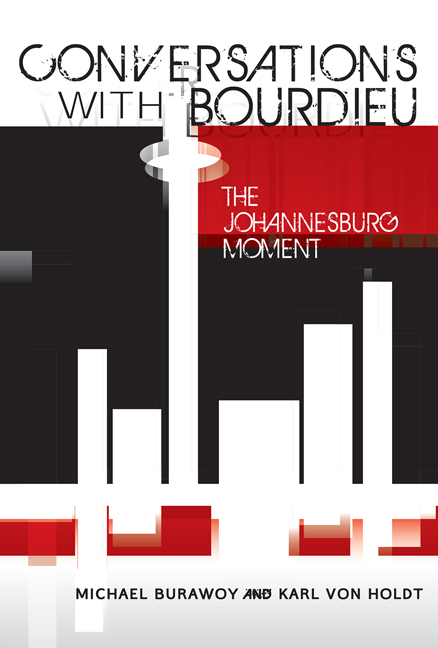Book contents
- Frontmatter
- Contents
- Abbreviations and acronyms
- Preface
- Prologue The Johannesburg Moment
- Acknowledgements
- CONVERSATION 1 SOCIOLOGY AS A COMBAT SPORT
- CONVERSATION 2 Theory and Practice
- CONVERSATION 3 CULTURAL DOMINATION
- Gramsci Meets Bourdieu
- Symbolic Challenge
- CONVERSATION 4 COLONIALISM AND REVOLUTION
- CONVERSATION 5 PEDAGOGY OF THE OPPRESSED
- CONVERSATION 6 THE ANTINOMIES OF FEMINISM
- CONVERSATION 7 INTELLECTUALS AND THEIR PUBLICS
- CONVERSATION 8 MANUFACTURING DISSENT
- Epilogue Travelling Theory
- Bibliography
- Index
Symbolic Challenge
from CONVERSATION 3 - CULTURAL DOMINATION
Published online by Cambridge University Press: 20 April 2018
- Frontmatter
- Contents
- Abbreviations and acronyms
- Preface
- Prologue The Johannesburg Moment
- Acknowledgements
- CONVERSATION 1 SOCIOLOGY AS A COMBAT SPORT
- CONVERSATION 2 Theory and Practice
- CONVERSATION 3 CULTURAL DOMINATION
- Gramsci Meets Bourdieu
- Symbolic Challenge
- CONVERSATION 4 COLONIALISM AND REVOLUTION
- CONVERSATION 5 PEDAGOGY OF THE OPPRESSED
- CONVERSATION 6 THE ANTINOMIES OF FEMINISM
- CONVERSATION 7 INTELLECTUALS AND THEIR PUBLICS
- CONVERSATION 8 MANUFACTURING DISSENT
- Epilogue Travelling Theory
- Bibliography
- Index
Summary
In Bourdieu, the symbolic violence that works through habitus is linked to the broader symbolic order through which the hierarchies of society and the meanings of those hierarchies are stabilised and made normal. Just as in Gramsci the state is central to the organisation of hegemony, so in Bourdieu it is central to maintaining and naturalising this commonsense social order. The state is the authority of authorities and, as such, imposes classification systems that sanctify prevailing hierarchies, establishes and reproduces shared symbolic forms of thought, and presides over a symbolic order that is, ‘in appearance at least, coherent and systematic … adjusted to the objectives structures of the social world’ (Bourdieu, 2000 [1997]: 176). Just as the state claims a monopoly over physical violence, so it claims a monopoly over the legitimate use of symbolic violence (Bourdieu, 1994).
South Africa presents substantial challenges to such conceptions. Here, social order has not settled into a ‘commonsense’ shape. Both in society and in the state, the symbolic order is contested, fluid and ambiguous.
Research into the state (Von Holdt, 2010a) suggests a profound contradiction between the Weberian rationales of a modern bureaucracy – which is, formally speaking, what is enshrined in the constitution, legislation, regulations and policies of the government – and informal rationales that constitute the state as the premier site of African sovereignty and black advancement. The result is a deeply racialised instability in the meaning of skill, authority and ‘face’ within the bureaucracy. Whereas the symbolic order of apartheid stabilised skill as an attribute of whites and fundamentally devalued the skills of blacks, the transition opened up a sharp contestation over the meaning of ‘skill’: many whites continued to question the skills of blacks at the same time as many blacks questioned the skills of whites who, in their view, had gained their positions because of race rather than skill.
The meaning of skill inside the state has become deeply ambiguous, and in many cases managers have been appointed who lack the experience through which complex technical and managerial skills are developed. Black advancement becomes more important than questions of competence or institutional performance. In such cases, incompetence spreads, as managers who lack the necessary skills appoint others who in turn cannot perform.
- Type
- Chapter
- Information
- Conversations with BourdieuThe Johannesburg Moment, pp. 67 - 73Publisher: Wits University PressPrint publication year: 2012

